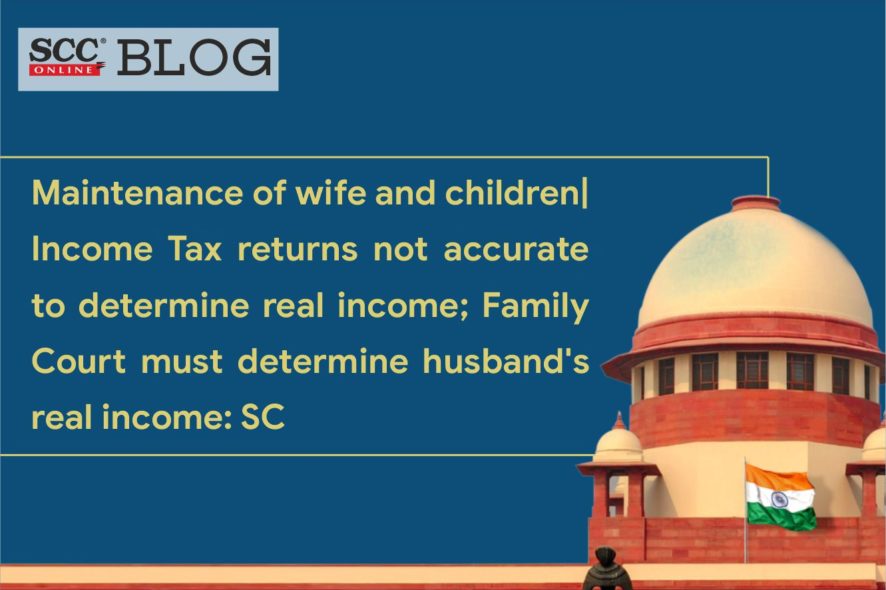Supreme Court: While deciding a case filed under Section 125 of Code of Criminal Procedure (CrPC), in which the appeal was arising from a Single Judge of High Court of Allahabad (High Court), the Division Bench of Dr. DY Chandrachud and Hima Kohli, JJ. thought it appropriate to restore the Criminal Revision to the file of the High Court for fresh consideration, thereby setting aside the impugned order of the High Court.
Facts of the Case
The Additional Principal Judge of the Family Court allowed an application under Section 125 of CrPC and directed the husband (Respondent 2) to pay maintenance at the rate of Rs. 20,000 per month to his wife (Appellant 1) and Rs. 15,000 each to his two daughters (Appellants 2 and 3).
While setting aside the order of the Family Court, the High Court held that “the Family Court had recorded that the husband was earning Rs. 2 lakhs per month, but the Income Tax Return (ITR) filed by the husband showed that he was earning Rs. 4.5 lakhs per month. Furthermore, this Court failed to appreciate that on what basis the Family Court had recorded the findings when there was nothing on record to demonstrate the same”.
Analysis, Law and Decision
The judgment of the High Court does not reflect correct appreciation of the reasons considered by the Family Court, which were as follows:
-
In the proceedings which were instituted by the husband under the Guardians and Wards Act, 1890, he himself stated that he had “good resources”.
-
When his wife claimed that her husband was unable to maintain the daughters, the husband had filed documentary evidence about his educational qualifications to demonstrate that he could raise the daughters.
-
Though the husband was in business with his father, he failed to disclose his income in the property statement, and he admitted that he had a rental house whose rent was paid by his father.
Based on these premises, the Family Court concluded that the husband had concealed the income which he earned from the business which he carried out with his father from the court. Moreover, the Family Court observed that the wife's contention that she was a partner in a company was incorrect and her family bears the expenses of her and her daughters. Thus, the Family Court issued directions for payment of maintenance.
The Court, reiterated the well settled principle that,
“Income tax returns do not necessarily furnish an accurate guide of the real income. Particularly, when parties are engaged in a matrimonial conflict, there is a tendency to underestimate income.”
Hence, it was for the Family Court to determine what would be the real income of the husband to enable the wife and daughters to live in a condition commensurate with the status to which they were accustomed during the time when they were staying together and thus, the High Court was not justified in setting aside the order of the Family Court.
By the interim order of this Court, the husband was directed to pay the arrears of maintenance computed in accordance with the order of the Family Court to his wife and daughters, but the husband had failed to comply with this direction and the amounts of Rs. 14.20 lakhs, Rs. 10.40 lakhs and Rs. 9.90 lakhs were due and outstanding to the wife and daughters, respectively.
The Court passed the following conditional order, giving a further opportunity to husband to comply:
-
The husband, in compliance with the interim order, must pay the entire arrears of maintenance payable to his wife and his daughters, within two months.
-
The impugned order of the High Court was set aside, and the Criminal Revision was restored to the file of the High Court. The payments which the husband had been directed to make to his wife and daughters shall abide by the final orders as may be passed by the High Court in the pending revisional proceedings.
[Kiran Tomar v. State of Uttar Pradesh, 2022 SCC OnLine SC 1539, decided on 31-10-2022]
Advocates who appeared in this case :
For the Appellant(s): Ravi Prakash Mehrotra, Senior Advocate
Nagendra Singh
Akansha
Ashish Pandey
Sanjay Gupta
Prateek Rai
Akash Choudhary
Dr. Sushil Balwada, AOR
For the Respondent(s): Priya Hingorani
Sunny Choudhary, AOR
Manoj Kumar
Abhimanyu Singh
Monika Rai
Sarvesh Singh Baghel, AOR







